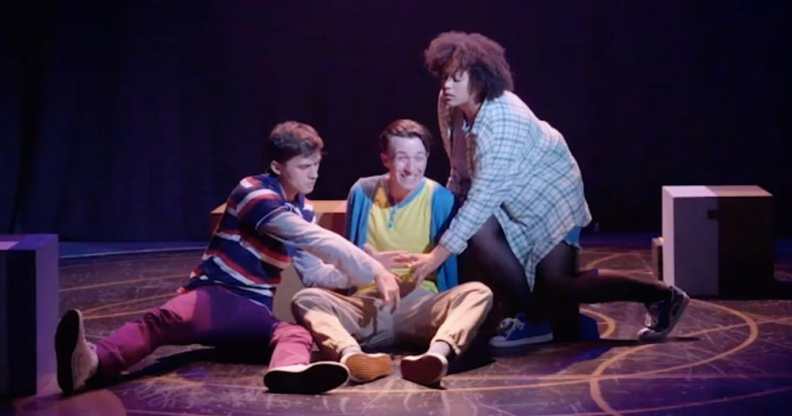Dumbledore is So Gay is the queer coming-of-age story LGBT+ Harry Potter fans deserve

Robert Holtom’s heartwarming play, Dumbledore is So Gay
If you could revisit your own childhood, what would you change? For those whose past is buried under layers of homophobia, the answer is endless.
This question is at the heart of Robert Holton’s play Dumbledore is So Gay, a coming-of-age time travel tale starring Alex Britt as Jack, a young Potterhead who’s discovering his sexuality when Dumbledore’s becomes a national talking point.
The play opens on 12-year-old Jack in French class, his life rooted in a reality many of us will recognise: the word “gay” used as a thoughtless insult, the parents who refuse to watch Graham Norton on TV, the constant policing of masculinity among boys.
The only difference is that Jack is equipped with a magical Time Turner just like the one from his beloved Harry Potter films, allowing him to turn back the clock on his own troubled past.
Max Percy and Charlotte Dowding complete the three-person cast as Jack’s best friends Ollie and Gemma, the Ron and Hermione to his Harry. Both seamlessly transition into an array of colourful characters: the tongue-tied Dad, the Eastenders-obessed Mum, the secretly-supportive French teacher.
But Jack’s attraction to Ollie and his perfect “ski-jump” nose lies at the centre of it all, the simmering undercurrent of tension and shame that only deepens as time goes on.
With his laddish mannerisms and exaggerated swagger, Ollie perfectly embodies the internalised homophobia that dominates the push-pull of the boys’ attraction through their early teenage years.
Ultimately their paths part as Jack is drawn to the bright lights of Heaven, where he rejoices in “a haze of smoke machines, sweat-dripping walls, gogo boys and a million shards of disco ball.” But suddenly tragedy strikes, and he’s dragged back to face reality and the pain he’s buried deep inside.
It’s then that Jack gives three twists of the Time Turner and brings us back to the French class where it all began, determined to navigate both his and Ollie’s sexuality differently this time.
The questions Jack asks himself speak to the very foundation of the closeted queer experience: What would my life be like if… my peers were accepting? If my parents were accepting? If I were accepting?
In this Dumbledore is So Gay pulls absolutely no punches – but unfortunately the same can’t be said of its approach to the author who inspires the play.
The only reference to JK Rowling’s impact on the LGBT+ community is a throwaway, tongue-in-cheek line: “I’ll speak to JK… Ron can be trans! She’ll love that!” which feels like something of a cop-out after the brutal, gritty honesty that characterises the performance.
But despite this omission the play is largely relatable; a fun and faithful celebration of self-discovery in the noughties filled with charming characters and witty one-liners that genuinely bring a laugh. And like all good plays, it leaves you reflecting long after the curtain is drawn.
Watch Dumbledore Is So Gay online – available until 17 October.

